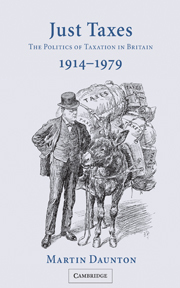Book contents
- Frontmatter
- Contents
- List of figures
- List of tables
- Preface
- List of abbreviations
- 1 The taxing state: an introduction
- 2 ‘The limits of our taxable capacity’: war finance, 1914–1918
- 3 ‘This hideous war memorial’: debt and taxation, 1918–1925
- 4 ‘Adjusting the particular turns of the different screws’: reforming the income tax, 1920–1929
- 5 ‘The great conflict of modern politics’: redistribution, depression and appeasement, 1929–1939
- 6 ‘The exigency of war’: taxation and the Second World War, 1939–1945
- 7 ‘The mortal blows of taxation’: Labour and reconstruction, 1945–1951
- 8 ‘A most injurious disincentive in our economic system’: Conservatives and taxation, 1951–1964
- 9 ‘Modern and dynamic economic policy’: Labour and taxation, 1951–1970
- 10 Rethinking taxation policy: from an opportunity state to an enterprise society, 1964–1979
- 11 ‘Highly defensible ramparts’: the politics of local taxation
- 12 Conclusion
- Appendix: chancellors of the Exchequer and prime ministers, 1908–1983
- Bibliography
- Index
10 - Rethinking taxation policy: from an opportunity state to an enterprise society, 1964–1979
Published online by Cambridge University Press: 23 December 2009
- Frontmatter
- Contents
- List of figures
- List of tables
- Preface
- List of abbreviations
- 1 The taxing state: an introduction
- 2 ‘The limits of our taxable capacity’: war finance, 1914–1918
- 3 ‘This hideous war memorial’: debt and taxation, 1918–1925
- 4 ‘Adjusting the particular turns of the different screws’: reforming the income tax, 1920–1929
- 5 ‘The great conflict of modern politics’: redistribution, depression and appeasement, 1929–1939
- 6 ‘The exigency of war’: taxation and the Second World War, 1939–1945
- 7 ‘The mortal blows of taxation’: Labour and reconstruction, 1945–1951
- 8 ‘A most injurious disincentive in our economic system’: Conservatives and taxation, 1951–1964
- 9 ‘Modern and dynamic economic policy’: Labour and taxation, 1951–1970
- 10 Rethinking taxation policy: from an opportunity state to an enterprise society, 1964–1979
- 11 ‘Highly defensible ramparts’: the politics of local taxation
- 12 Conclusion
- Appendix: chancellors of the Exchequer and prime ministers, 1908–1983
- Bibliography
- Index
Summary
… take the whole tax system to pieces and put it together again in a way that will radically alter the economic climate–the framework of rewards and penalties in which personal and corporate decisions are taken within the economic system.
Bodleian Library, CPA, CRD 3/7/6/6, ‘Swinton policy weekend 1967: report’, J. Douglas, 26 Sept. 1967… there are two well-established Conservative principles which ought to be applied to personal taxation. One is to improve personal incentives; the other is to encourage the broader ownership of capital.
Bodleian Library, CPA, CRD 3/7/6/9, Policy Group on Future Economic Policy, ‘Personal taxation: An agenda’, William Rees-MoggThere may well be a good case for the euthanasia of the share-holder as well as the rentier; equally, high net incomes may have no place in a Socialist society. These are all legitimate objectives. But it is the height of folly, while pursuing these objectives, to pay lip-service to the merits of private enterprise and then simultaneously, ensure that the forces which make such an economy tick are suppressed. Only when the [Labour] Government makes up its own mind as to the type of society and economy it wants to create will it be possible to evaluate the relevance and adequacy of its fiscal policy.
A. R. Ilersic, ‘Taxes, 1964–66 an interim appraisal’, British Tax Review (1966), 373‘A kind of tax prison’: Conservatives in opposition and government, 1964–1974
Conservative fiscal strategy rested on the assumption that economic growth was promoted by personal risk-taking and enterprise in a free market.
- Type
- Chapter
- Information
- Just TaxesThe Politics of Taxation in Britain, 1914–1979, pp. 302 - 338Publisher: Cambridge University PressPrint publication year: 2002



